
15 minute read
What's Your Why (and is it Enough)?
With National REIAU, we have made learning from some of the best fast, easy and inexpensive. National REIAU delivers great lowcost, high-quality investor training on exactly the subject you want, exactly when you want it.
L e a r n m o r e b y
Advertisement

visiting
nationalreiau.com

By Whitney Nicely
Recently I got the terrible news that a business mentor of mine in the virtual world passed away. This amazing woman, known by most as the Six-Figure Chick, taught me so much about business in a million different ways. While she was not really into real estate investing, she had such an incredible vision for building something bigger than herself. She was not in business only for the money. In fact, the only time I know of where she did something “extravagant” with the $100,000 she brought in every single month was when she bought a new “Beemer” and paid cash for it on the spot. She lived to build a legacy; something intangible that will outlast her short-lived life. Money is not enough, so what is your “why?”
As much as we all know how much fun it is to bring in money and make money, it is really not a motivator in and of itself. Money is temporary and fleeting. It comes and it goes, if we make it only about the things and the stuff. But, I cannot help but think how beautiful it is when the “why” behind the business is so much bigger. Cici, the Six-Figure Chick, was a shining example of a life that was lived for more than herself. She made sure that her houses were paid off, her husband was left with a solid foundation, and her mother had a home where she could rest her head safely. She lived for more than herself.
The more we can keep a handle on the limitations of money, the more we will be able to get out of it. Money creates a life of value and purpose, where we can invest in the lives of others and add beauty and goodness into the world. It is not enough for it to just sit and accumulate in the bank account, or to be turned into one toy after another. What value does that bring or add? Money can be a huge blessing to life, if we keep our focus on leaving a legacy. I know how tricky this can be, though. It is not bad or wrong to buy things or have “stuff,” but the question is really about the deeper purpose and “why” behind the actions. What is the motivation? Is it to connect more deeply with other people, or to see yourself as better than everyone else? Do you feel some inner lacking as a person that you want to fill with cash? Or do you have a vision for a life of freedom that drives you through the most difficult life seasons?
Money is a tool. A tool is only helpful if you know how to use it. It is most helpful if there is a plan and a purpose for you to have it in the first place! What good is a hammer if there is not a project that requires a nail? What good is a screw without a screwdriver? Money works best with a plan and a purpose. So, what is your plan? Do you have a purpose bigger than to be able to buy things and do stuff? If not, what is stopping you? Without a purpose that is bigger than a momentary and fleeting experience, it is so much harder to dig in and push through those incredibly difficult times that come up! And they will come, you can be sure about that. It is just how life is. But, that does not mean that you need to crumble. Not at all.
Ask yourself why you are in this real estate world. What is it that keeps you going when the going gets tough? What is the vision that you have at the end of your journey or that you want to achieve throughout it? Can you put it into words yet? If not, I challenge you to get it crystal clear for you. Do the vision board or write the list; whatever it takes to anchor you in the confidence to hold strong to your dream and be firm in your determination. The journey is worth it when the destination is known. So, discover and focus on your why and you will surely be unstoppable.
Whitney Nicely rejected the southern girl path of working at her family’s trucking business and embraced the life of an investor. Her first nine months made her over $140k, and set her on the path to empowering other women to break into the real estate “good ‘ole boys club” and break down barriers while making some serious cash. She is the President of Knox REIA and was featured in the RE Journal’s “Member Spotlight” in Spring, 2016. Learn more about Whitney by visiting SheBuysIt.com.
being called into the ministry at the age of 39. I became a pastor in Virginia and then accepted the pastorate of a church on the Big Island. I thought all I’d ever do is pastor a church, so real estate investing sort of came out of the blue.
Where is your current market and what is your focus or area of expertise?
When it comes to any sort of flipping, I restrict my efforts to the Big Island right now. I live in Kailua-Kona, but I’ve done almost all my work on the other side of the island near Hilo. Since it’s about an hour and a half drive over there, I’m looking to do more deals on this side of the island. My buy and holds are all in northwest Florida, which is where we’re thinking of retiring or at least semi-retiring one day. As for lending, we finally got our first Hawai’i project a couple months ago. Prior to that we were doing all our lending in Texas.
How did you get started?
I went to a three-day FortuneBuilders seminar with a friend who’s been very successful with rentals. He didn’t get involved, but my wife and I signed up. The last house Khristine and I owned in Virginia is what we like to call an “eightyear flip.” We renovated every room in that house, and some twice. I learned how to hang drywall, mud, sweat pipes, lay tile, blow in insulation, you name it. We figured if we could do that for ourselves, why not do it for profit?
Describe a typical work week for you as a real estate investor:
It’s been a very busy time as a real estate agent this year, so investing has taken somewhat of a back seat. When I’m involved in a project, I like to keep close communication with the general contractor, making sure we’re hitting our milestones. I also try to check out the local market on a daily basis for possible deals. As a real estate agent, I have access to the MLS, though I seldom find the best deals there. I try to have at least one marketing campaign going, whether it’s for distressed houses, probates, or even vacant land. I like driving for dollars and getting out to see potential properties as often as I
Pratt came to the Big Island to pastor a church, and real estate investing "sort of came out of the blue."
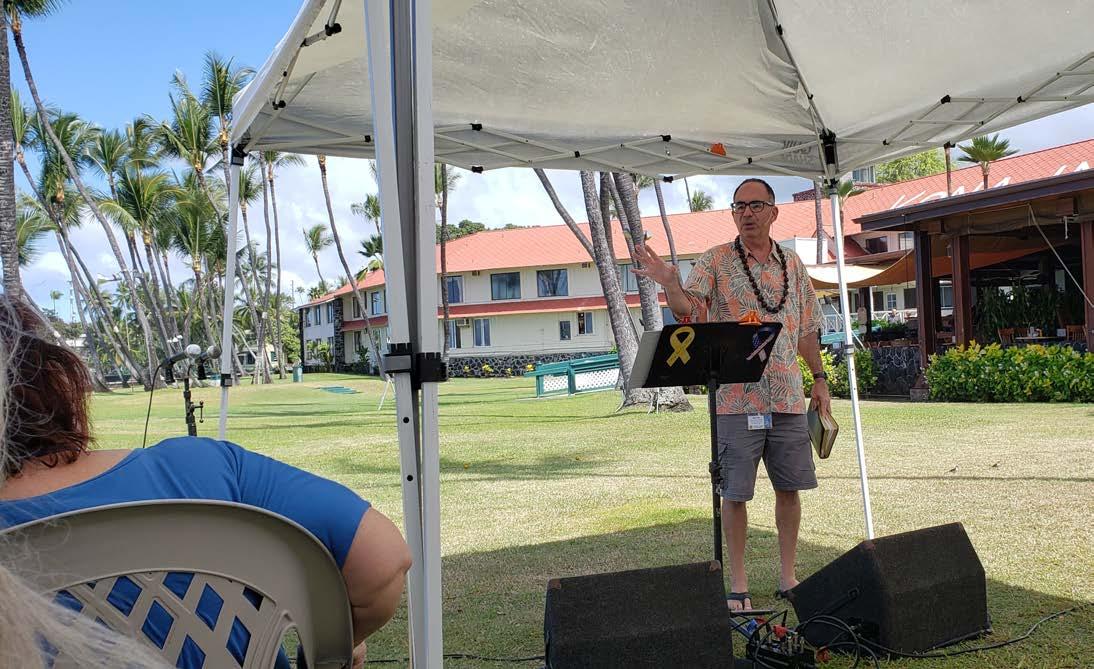
can. Because of the drive time, though, I’m learning to do more desktop analyses. I also take time to network with other investors, contractors, and various professionals, such as lenders and financial experts.
How long have you been investing in real estate?
I started my first deal in 2016.
Tell us about your first deal:
A lady called me, saying she saw one of my signs. What’s funny about that is I didn’t have any signs out. I’m pretty sure she saw my Craigslist ad saying I buy houses in any condition. It was a 3-bedroom, 2-bath house on an acre. She and her husband bought it as a foreclosure and wanted to fix it up for their grown kids. Unfortunately for them, none of their kids wanted to live in the house. They had spruced up the outside, but the inside was a wreck. I purchased the house, using what ended up being a conventional loan. That worked out, because with the time it took to complete, I would have been in trouble if I’d used hard money. I hired a local contractor and we were off to the races. The house needed a new kitchen, new bathrooms, new flooring and interior paint. I underestimated the cost of the rehab, and it didn’t help that the contractor took a lot longer to finish the house than he should have. He went great guns for the first half of the project and then started pulling his people to start working on his next projects. In the end I was able to sell the house for considerably more than I had initially planned, which helped me turn a profit on the project. Not a huge profit, but it was still a win.
How do you fund your investments?
I’ve used bank loans and private money. I’ve also procured a line of credit.
Do you have a real estate license?
I got my Hawai’i real estate license after I became an investor. There are plusses and minuses to having a license. It’s great to not have to call an agent to get comps or help with research. There are some great websites and tools out there, but I’ve not found anything that is as accurate or up-to-date as the MLS. And the commissions are always nice when I purchase or sell a property for my company through the MLS (though that’s not always the case with bankowned properties.) It can be a drag though, being an agent when it comes to buying and selling your own properties. I don’t know if it’s this way everywhere, but agents don’t have nearly the freedom that an average investor enjoys here in Hawai’i. Instead of being able to just use a simple, straightforward contract and get the transaction done, I have to follow the same protocol that I would if I were representing a real estate client. This definitely can slow things down, and it ends up costing me more.
What projects are you currently working on?
I’m not involved in any projects myself currently, but my wife and I are lending on three deals. One is a flip in Hawai’i and the other two are new builds in Texas.
How much time do you put into your real estate education?
Not nearly as much as I should. A couple hours per week, on average. Plus, whatever time I spend on watching the market.

Has coaching or mentoring played a part in your success?
Mentors have been a big help to me in getting where I am today. The coaching I’ve received from FortuneBuilders got me off zero, to be honest. I was pretty stuck in analysis paralysis for quite a while, until a couple of my coaches called me out and said I needed to get it in gear. One coach told me that if I wasn’t marketing, I didn’t have a business. Ouch! Beyond them, I’ve come to know some great investors here in Hawai’i. What I love about the investor community is that most people operate from an abundance mentality, instead of a scarcity mentality. They don’t see you as a competitor, but as a fellow investor. There’s a willingness to Continued on Page 15
Real Estate Journal · Fall 2020
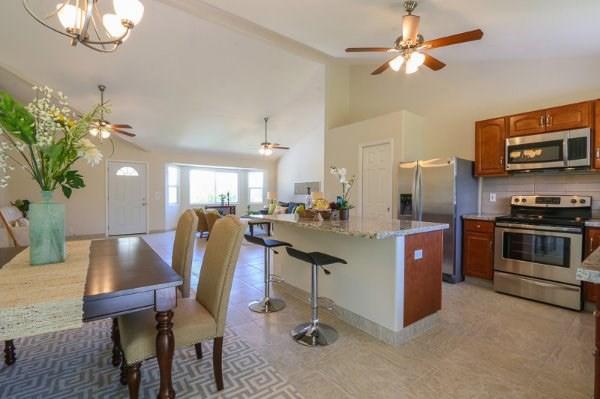
ABOVE: Interior, pre-renovation.
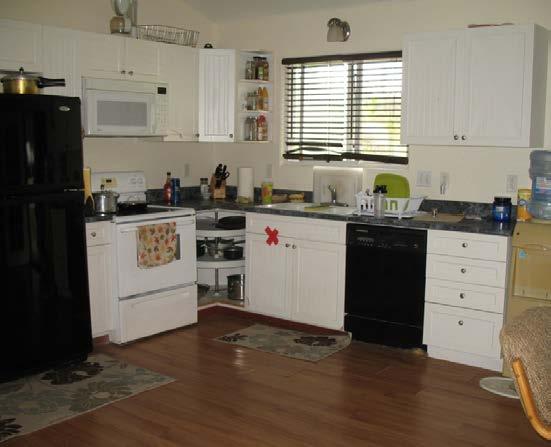
LEFT and BELOW: Interior of Kahakai property, after renovations.
share best practices and what they’ve learned that worked for them…or what hasn’t worked. One other kudo for my coaches, and this is a big one. Shawn Tiberio, who gave me so much valuable coaching early on, told me that if there wasn’t a REIA in my area I should start one. He gave me a lot of great advice in getting our West Hawai’i REIA off the ground. Mahalo, Shawn!
What are your current and future goals?
I’m gearing back up to start doing flips again in 2021. I’m also working with a general contractor friend to start some new builds. I’m watching the markets closely to see when this makes sense. Ultimately, Khristine and I are looking to build our buy and hold inventory and private lending capacity so that we have a comfortable retirement income. Success in the flip and new build arena will help us reach that goal much quicker.
What has been your top struggle in this business?
If I’m being honest, it would be consistency. Nobody is calling me up and asking me what I’m working on. I love that, but it takes focus to stay consistent.
What do you like most
Before (lower right) and after (above) photos showing the exterior of Kahakai property that Pratt recently renovated.
about what you do?
I like the freedom to determine what I do every day. Sure, the needs and demands of the business force your hand lots of the time, but I’m still in charge of my destiny. If I don’t like the way things are heading, I have the power to change direction. I didn’t have that when I was sitting in a cubicle programming computers.
Do you have a tip or advice that you would pass along to other investors?
My dad taught me two important lessons in business. He told me years ago, “Never burn bridges.” It’s absolutely true that there are some people you don’t want to be in business with, because they aren’t ethical. But when it comes to those stressful times and there are a lot of bucks at stake, don’t let your anger or frustration wreck a valuable business relationship. Second, be willing to do the small things for people. My dad ran his own computer business, and I remember he personally delivered a $200 printer cable to this man one day. I gave him a hard time about that. Why would he waste his time on something so trivial? As it turns out, that simple act of humble service opened the door to a long-term contract that earned my dad’s company hundreds of thousands of dollars. I’ve applied both of these to
my real estate investment business and
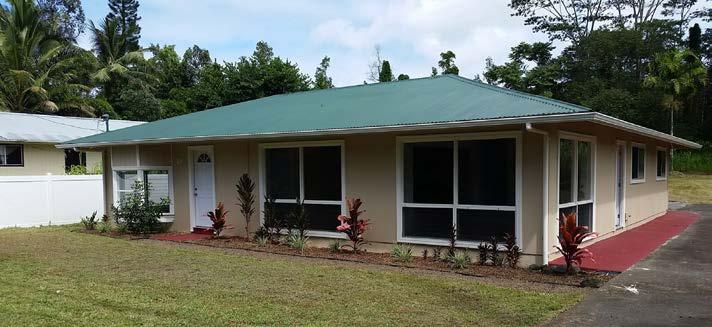
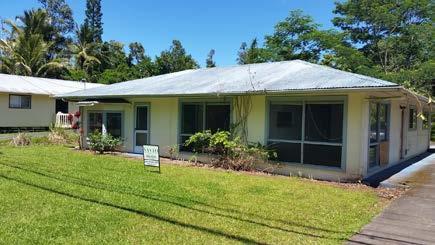
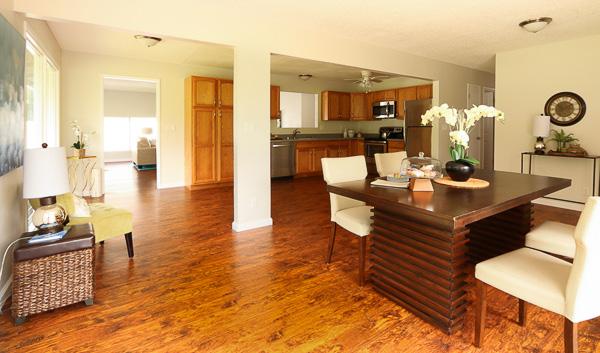
have been blessed by the results.
Back in the day I tried my hand as a stockbroker for a little while. A saying from that industry still guides me: “bulls make money, bears make money, pigs get slaughtered.” Translated to real estate investing, you can make money in any market, up or down. But don’t hang on to a property, thinking you’re going to maybe make a killing. If you’re offered a price that works with your numbers, take it and move on to the next deal.
How important is joining a local REIA to a new investor?
Being part of a local REIA is critical to a new investor for a number of reasons. First, this is where you can make many valuable connections with other investors, tradespeople, real estate agents, financial experts, and other professionals. It’s through this networking that you can find and finance deals, build partnerships, and ramp up your business much quicker than you ever could on your own. Second, a local REIA is going to be geared to your local market. Sure, you can find out a lot about economic and real estate trends from great sources on the internet, but they won’t be able to drill down to the very neighborhood level like a REIA can. Third, there’s great value in learning from the successes and mistakes of others. Whether its through a formal deal analysis at a REIA meeting, attending a mastermind session, or just in casual conversation, you can learn a lot about best practices, pitfalls to avoid, good (or not so good) contractors and vendors, and creative ways to finance your deals. And the opportunity to ask questions should not be underestimated.
What is your favorite selfhelp or business book?
The Bible. Whether you believe in God or not, it has a lot to say about money, people, and business.
Do you have any interesting hobbies or something unique that you like to do?
We had this big blank spot in our front yard, so we put in a koi pond. We only have room for three koi, but it’s amazing how this area which measures about 400 square feet has turned into its own ecosystem. All sorts of birds and lizards and geckos and bees other creatures either live there or come by for a drink or a bath on a weekly basis. Even though we live in a very sunny and fairly dry environment, the lava rock around the pond is covered with moss. It’s fun and relaxing to tend to this little sanctuary and see how it changes on an almost daily basis. And since we have cane toads that hop in from time to time, I get the excitement of hunting them so they don’t breed in my pond.
Does your business have a website? www.holomuaproperties.com
Social media accounts? https://www.facebook.com/bruce. pratt.96/

